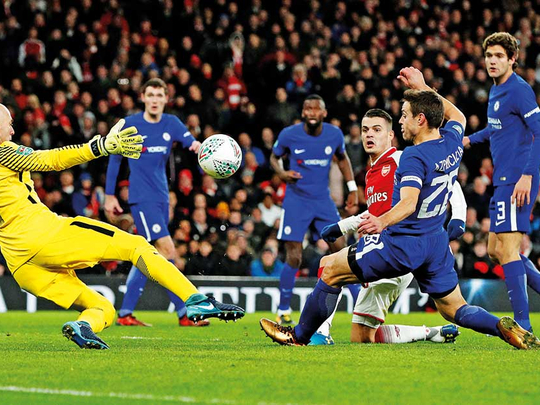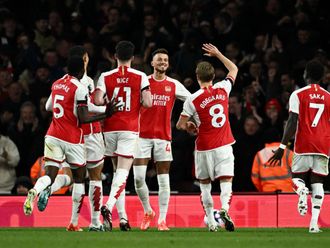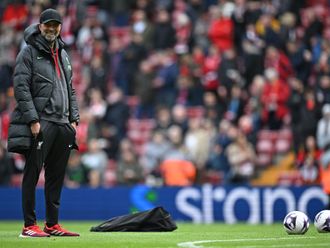
London: Antonio Conte’s reign at Chelsea, or at least the meaningful part of it, began with a half-time switch to a back three at the Emirates, and it feels a lot like it has ended with a half-time switch to a back three. Perhaps the Champions League could yet save a drifting season — memories of that win away against Atletico haven’t entirely faded — but it was the feel of Wednesday night that was so damning. When, after all, was the last time anybody was out-tacticked by Arsene Wenger?
It was at half-time the 3-0 defeat away to Arsenal last season that Conte switched to the back three that would lead to a run of 13 successive league wins and ultimately the title. On Wednesday Arsenal had been largely outplayed in the first half, but dropping Mohamed Elneny deeper to become a third centre-back helped clog the pastures in which Eden Hazard had been frolicking. Chelsea, bafflingly, had no solution.
Arsenal were lucky with both goals they scored, of course, but while it would be misleading to suggest they were much more than dogged, there is at least a sense of new life breathing through the club once again. They have been there before of course, three times a season or so over the past decade without anything really coming of it, but the relief that the Alexis Sanchez saga is finally over is almost palpable. Wenger has been so rejuvenated he is not merely changing formation mid-game but has taken to devising funky corner routines. A new padded coat and a reckless haircut could come at any moment.
But a League Cup here or a League Cup there won’t significantly alter the Wenger legacy, however nice it may be for him to complete the set of domestic English trophies. The far bigger issue is Chelsea. Crisis is a word devalued by overuse in modern football, and rarely means more than the thing we’re talking about this week, but then most many basic aspects of football have seen their values change over time: winning, for instance, and trophies.
The difficulty in which Chelsea find themselves is a very modern one. Before Wednesday’s defeat they were unbeaten in 12 games. They’ve lost only two of their past 21. They’re still in Europe and the FA Cup and they’re third in the Premier League. At almost any previous point in football history, that would represent an extremely promising start to the season, but not now, not in the era of the super-clubs, when most of the league is there to be trampled upon and the restriction of success to a tiny elite means the slightest slip-up can appear catastrophic.
Chelsea looked physically jaded at the Emirates. It can have come as no great surprise that what was possible last season with no European football has proved impossible to replicate with a similarly sized squad this (in that sense, at least, Jose Mourinho is right to claim some credit for Conte’s success). Conte has warned of the thinness of his squad since last summer, culminating in his comment this week that Chelsea can no longer compete financially with the Manchester clubs.
Few will have much sympathy given it was Chelsea, with the accession of Roman Abramovich in 2003, who dragged English football into its new financial age, and so torpedoed Arsenal’s vision of a golden supremacy rooted on the riches of a new stadium (modern English football, in that sense, began with Wayne Bridge’s 87th-minute winner at Highbury in the Champions League quarter-final in 2004). But the result of their policy of retrenchment, at least until somebody remembered how well Edin Dzeko had played against them this season, was a recruitment strategy apparently based on a decade-old list predicting Young English Stars of the Future: Danny Drinkwater, Ross Barkley, Andy Carroll, Peter Crouch ... Chelsea 2018, the team England’s Euro 2012 squad could have been.
There was a time when a major part of football management was working out ways to reinvigorate talent that hadn’t quite developed or had gone off the boil. That was a significant part of the genius of Brian Clough or Bob Paisley. It may even be the case that football would be a better place if that were still a relevant skill, but it feels a curiously quaint approach at the top end of the modern game.
And that contributes to the other troubling aspect of Chelsea’s performance on Wednesday: their mental weariness. Yes, the hamstring injury sustained by Willian in the first half hampered them. Yes, their options were reduced by injuries to Cesc Fabregas and Alvaro Morata, and by Pedro’s slump in form. But still, it was startling how becalmed they were once the initial plan of giving the ball to Hazard stopped working.
Perhaps the arrivals of Dzeko and Emerson Palmieri will jolt them back into life, but Wednesday’s performance was that of a team that had already begun a long slow drift to the end of the season and the inevitable departure of their manager.









